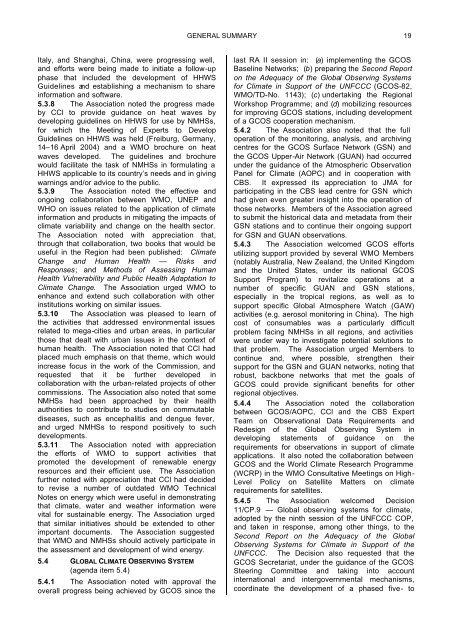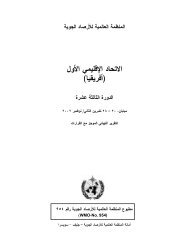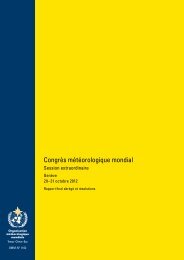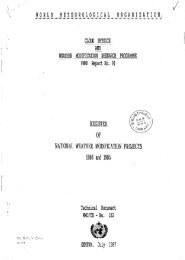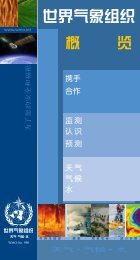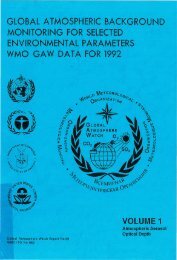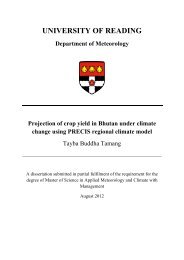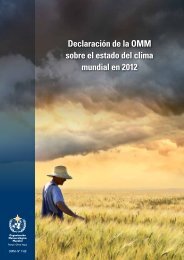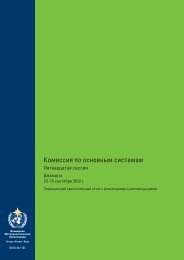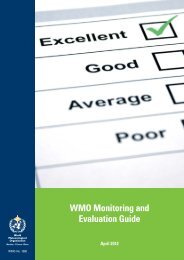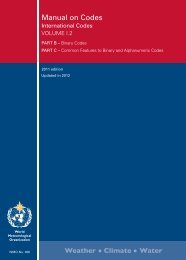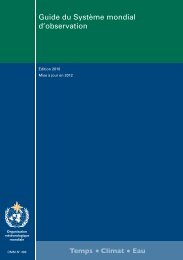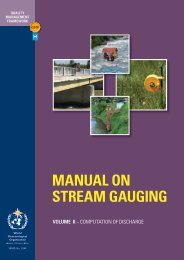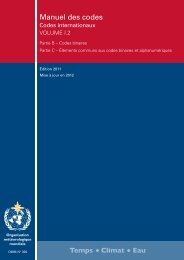Regional Association II (ASIA) - E-Library - WMO
Regional Association II (ASIA) - E-Library - WMO
Regional Association II (ASIA) - E-Library - WMO
Create successful ePaper yourself
Turn your PDF publications into a flip-book with our unique Google optimized e-Paper software.
GENERAL SUMMARY 19Italy, and Shanghai, China, were progressing well,and efforts were being made to initiate a follow-upphase that included the development of HHWSGuidelines and establishing a mechanism to shareinformation and software.5.3.8 The <strong>Association</strong> noted the progress madeby CCl to provide guidance on heat waves bydeveloping guidelines on HHWS for use by NMHSs,for which the Meeting of Experts to DevelopGuidelines on HHWS was held (Freiburg, Germany,14–16 April 2004) and a <strong>WMO</strong> brochure on heatwaves developed. The guidelines and brochurewould facilitate the task of NMHSs in formulating aHHWS applicable to its country’s needs and in givingwarnings and/or advice to the public.5.3.9 The <strong>Association</strong> noted the effective andongoing collaboration between <strong>WMO</strong>, UNEP andWHO on issues related to the application of climateinformation and products in mitigating the impacts ofclimate variability and change on the health sector.The <strong>Association</strong> noted with appreciation that,through that collaboration, two books that would beuseful in the Region had been published: ClimateChange and Human Health — Risks andResponses; and Methods of Assessing HumanHealth Vulnerability and Public Health Adaptation toClimate Change. The <strong>Association</strong> urged <strong>WMO</strong> toenhance and extend such collaboration with otherinstitutions working on similar issues.5.3.10 The <strong>Association</strong> was pleased to learn ofthe activities that addressed environmental issuesrelated to mega-cities and urban areas, in particularthose that dealt with urban issues in the context ofhuman health. The <strong>Association</strong> noted that CCl hadplaced much emphasis on that theme, which wouldincrease focus in the work of the Commission, andrequested that it be further developed incollaboration with the urban-related projects of othercommissions. The <strong>Association</strong> also noted that someNMHSs had been approached by their healthauthorities to contribute to studies on commutablediseases, such as encephalitis and dengue fever,and urged NMHSs to respond positively to suchdevelopments.5.3.11 The <strong>Association</strong> noted with appreciationthe efforts of <strong>WMO</strong> to support activities thatpromoted the development of renewable energyresources and their efficient use. The <strong>Association</strong>further noted with appreciation that CCl had decidedto revise a number of outdated <strong>WMO</strong> TechnicalNotes on energy which were useful in demonstratingthat climate, water and weather information werevital for sustainable energy. The <strong>Association</strong> urgedthat similar initiatives should be extended to otherimportant documents. The <strong>Association</strong> suggestedthat <strong>WMO</strong> and NMHSs should actively participate inthe assessment and development of wind energy.5.4 GLOBAL CLIMATE OBSERVING SYSTEM(agenda item 5.4)5.4.1 The <strong>Association</strong> noted with approval theoverall progress being achieved by GCOS since thelast RA <strong>II</strong> session in: (a) implementing the GCOSBaseline Networks; (b) preparing the Second Reporton the Adequacy of the Global Observing Systemsfor Climate in Support of the UNFCCC (GCOS-82,<strong>WMO</strong>/TD-No. 1143); (c) undertaking the <strong>Regional</strong>Workshop Programme; and (d) mobilizing resourcesfor improving GCOS stations, including developmentof a GCOS cooperation mechanism.5.4.2 The <strong>Association</strong> also noted that the fulloperation of the monitoring, analysis, and archivingcentres for the GCOS Surface Network (GSN) andthe GCOS Upper-Air Network (GUAN) had occurredunder the guidance of the Atmospheric ObservationPanel for Climate (AOPC) and in cooperation withCBS. It expressed its appreciation to JMA forparticipating in the CBS lead centre for GSN whichhad given even greater insight into the operation ofthose networks. Members of the <strong>Association</strong> agreedto submit the historical data and metadata from theirGSN stations and to continue their ongoing supportfor GSN and GUAN observations.5.4.3 The <strong>Association</strong> welcomed GCOS effortsutilizing support provided by several <strong>WMO</strong> Members(notably Australia, New Zealand, the United Kingdomand the United States, under its national GCOSSupport Program) to revitalize operations at anumber of specific GUAN and GSN stations,especially in the tropical regions, as well as tosupport specific Global Atmosphere Watch (GAW)activities (e.g. aerosol monitoring in China). The highcost of consumables was a particularly difficultproblem facing NMHSs in all regions, and activitieswere under way to investigate potential solutions tothat problem. The <strong>Association</strong> urged Members tocontinue and, where possible, strengthen theirsupport for the GSN and GUAN networks, noting thatrobust, backbone networks that met the goals ofGCOS could provide significant benefits for otherregional objectives.5.4.4 The <strong>Association</strong> noted the collaborationbetween GCOS/AOPC, CCl and the CBS ExpertTeam on Observational Data Requirements andRedesign of the Global Observing System indeveloping statements of guidance on therequirements for observations in support of climateapplications. It also noted the collaboration betweenGCOS and the World Climate Research Programme(WCRP) in the <strong>WMO</strong> Consultative Meetings on High-Level Policy on Satellite Matters on climaterequirements for satellites.5.4.5 The <strong>Association</strong> welcomed Decision11/CP.9 — Global observing systems for climate,adopted by the ninth session of the UNFCCC COP,and taken in response, among other things, to theSecond Report on the Adequacy of the GlobalObserving Systems for Climate in Support of theUNFCCC. The Decision also requested that theGCOS Secretariat, under the guidance of the GCOSSteering Committee and taking into accountinternational and intergovernmental mechanisms,coordinate the development of a phased five- to


